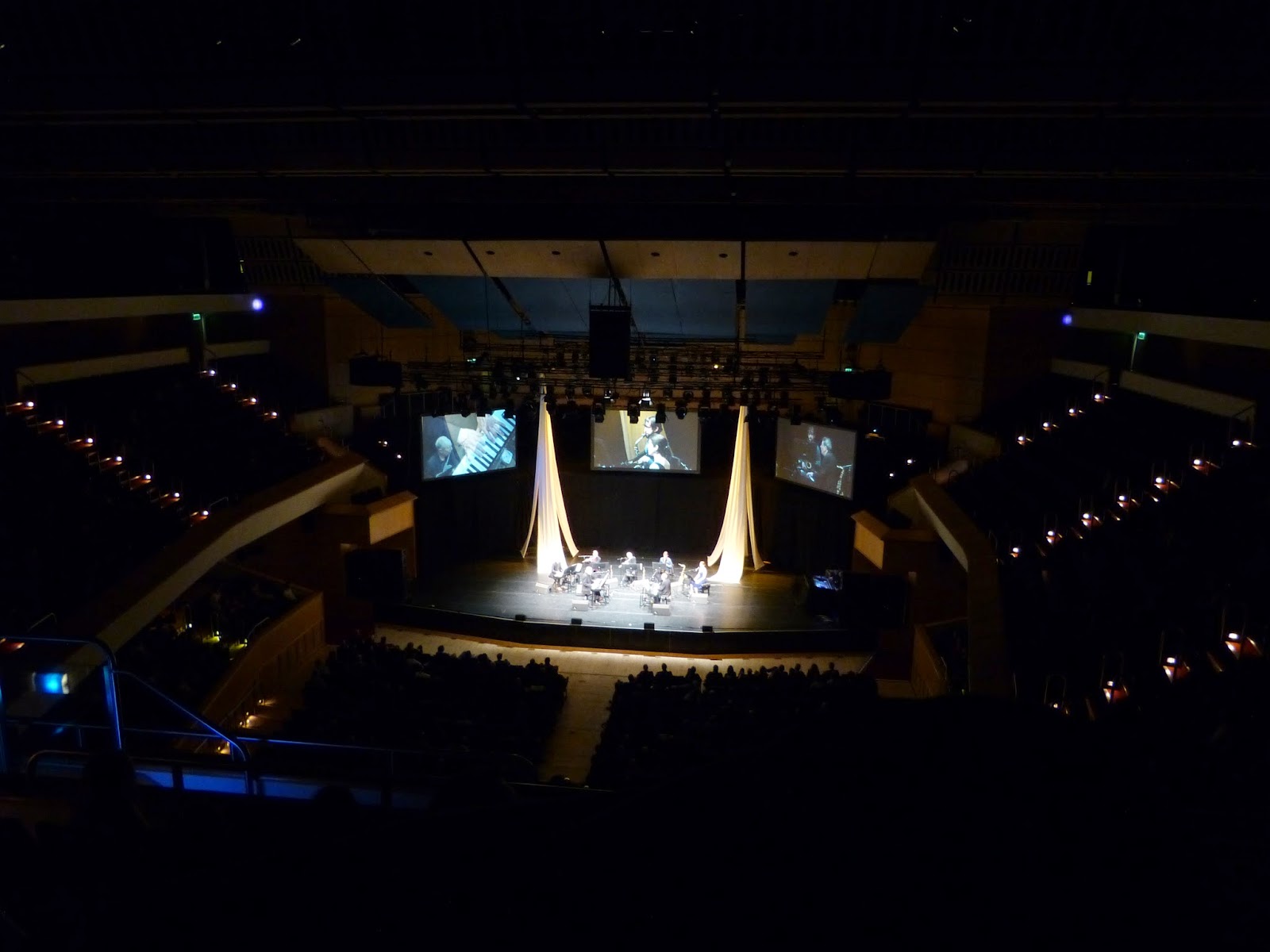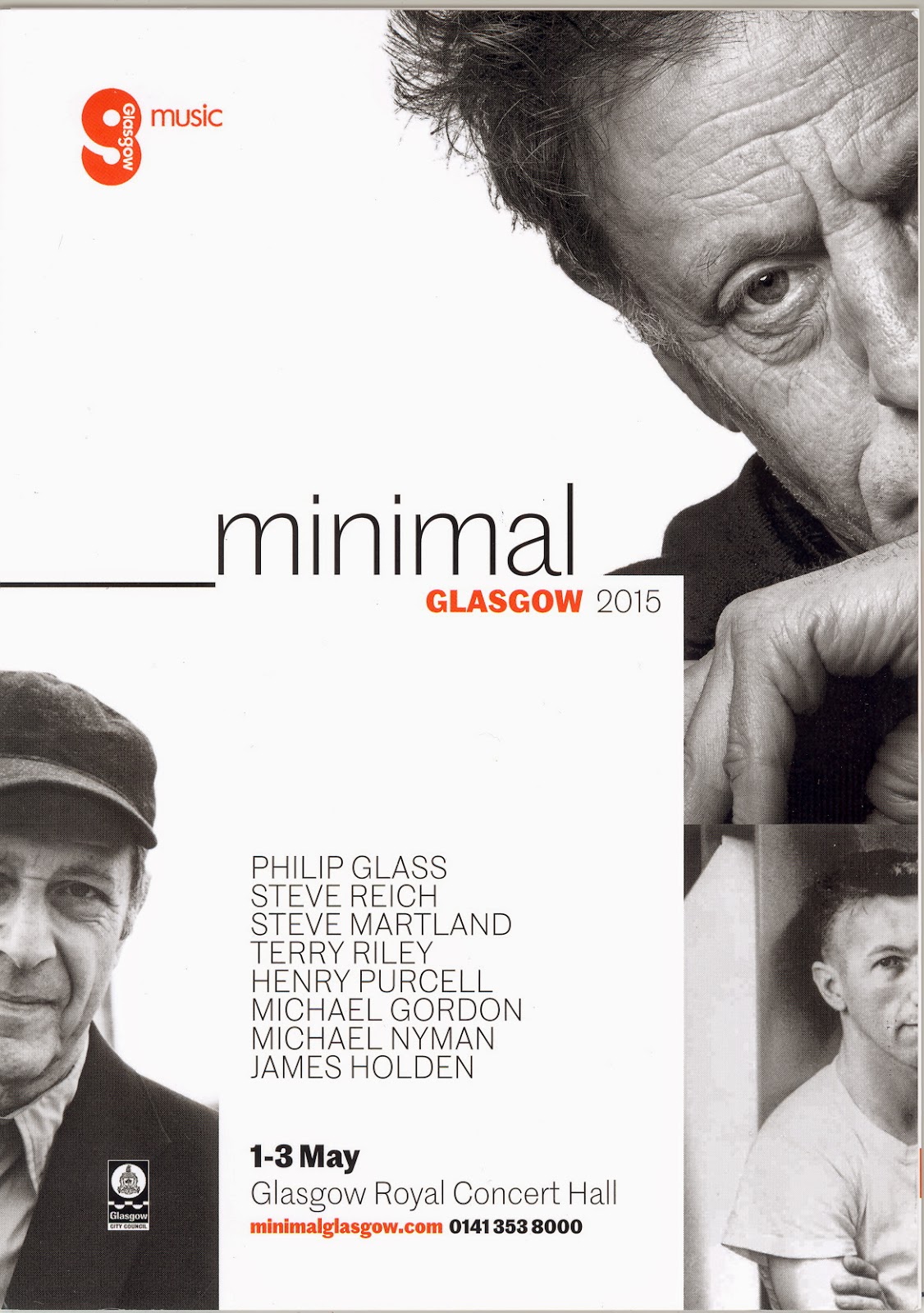When
I mentioned to a work colleague that I was planning to attend a Philip Glass
concert, she somewhat bafflingly replied “Well at least you will get some peace
and quiet”. Asking her to explain, she
asserted “He was the guy who did that four minutes of silence thing, wasn’t
he?”
She
was, of course, thinking of John Cage, but the fact the two composers can still
be confused, I suppose, attests that to many people Mr. Glass is still inextricably
linked to the avant-garde. This despite
the fact he has, since the mid-1970s, been producing work, if not quite in the mainstream
then certainly utilising what I suppose may be described as rather more
conventional compositional methods. Witness
his film soundtracks for Candyman, Hamburger Hill and Notes on a Scandal, to
name but three.
I
first began dipping my toe into his work when I discovered his Etudes – those
twenty fiendishly complex pieces written for solo piano. Indeed, Glass was in London just a few days
ago to play just these very compositions.
I would really have liked to attend this performance, but upon discovering
he was also visiting Glasgow to perform his Music in 12 Parts, I decided this
would make an acceptable consolation prize.
I
was less familiar with this piece, but knew it to be a bit of a magnum opus:
lasting over three-and-a-half hours in total.
Fortunately for both the audience’s sanity and his Ensemble’s bladders,
Glass tends to split the piece into four blocks for performance – Parts 1-3,
Parts 4-6, Parts 7-9 & Parts 10-12 – each section nevertheless taking the
form of a single chunk of music lasting around 55 minutes. Phew.
There
were 15 minute “pauses” after both Part 3 and Part 9 and (really rather
wonderfully) a “Dinner Break” of an hour scheduled in the middle. Thus it was, at the half-way point, we had
the odd sight of the Glasgow Concert Hall emptying as folks spilled onto the
streets making for chippies, Pizza Hut or one of the nearby restaurants
depending upon the depth of their pockets.
It certainly represented a first for me to enjoy a black pudding supper
midway through a gig.
 |
| Stage setup prior to concert |
 |
| Philip Glass Ensemble - Glasgow 2015 |
 |
| Lisa Bielawa & Philip Glass |
 |
| Philip Glass Ensemble - Glasgow 2015 |
 |
| Philip Glass Ensemble - Glasgow 2015 |
 |
| Lisa Bielawa & Philip Glass |
 |
Music
in 12 Parts was composed by Glass during the early/mid Seventies, towards
the end of his minimalist phase, and the whole piece relies very much upon repetition
– lots and lots of it. It is written for
three electric organs, either two or three musicians playing saxophones/flutes
plus a female soprano voice (Lisa Bielawa, this evening).
Attempting
to give one an impression of the music is rather difficult. Part 1 is markedly different from the rest of
the composition and acts as a gentle introduction I suppose, although giving no
indication of what is to come. It is dream-like,
pastoral and could almost be shoe-horned into the genre of ambient. But
then Part 2 crashes in with no break, and the three keyboard players together lay
down an intricate network of repetitive arpeggio, over which is layered subtle
interjections from the wind and reed instruments. Soaring above all of the aforementioned, the female
voice sings (or perhaps vocalises would be a better term) a beguiling
repetition of solfege syllables.
But
I could not help but think the vocabulary being used stretched beyond the
traditional Do Re Me Fa So La Ti Do, for I am sure Bielawa was intoning at some
point “Crazy, Crazy” over and over again.
There was also during Part 5 what sounded like "Vosina, Vosina",
then later on “Jonah, Jonah" and, most intriguingly, "Semen,
Semen". All very odd, yet
beautifully hypnotic.
Glass
conducted proceedings by regularly giving a slow deep nod of the head to
signify to the other musicians it was time to make some subtle (often too subtle
for my ears) change to the progression.
Part
9, with its wilfully atonal keyboard runs, I have to say I found more than a
little challenging, and caught myself struggling to disguise yawns. The woman to my left’s method of coping was
to begin discreetly sipping what smelt suspiciously like Drambuie from a hip
flask she had secreted in her handbag.
During
the final interval, a small part of me considered sneaking out, but decided NO. The aurally challenging Part 9 had I decided clearly
been a deliberate test of resolve.
Rather like Becher’s Brook in the Grand National it existed to weed out
the weaklings, and only the truly committed would be allowed to sample the
delights of parts 10-12. So I gritted my
teeth and resolved to persevere to the conclusion.
But
I needed some change to my environment to recharge my enthusiasm so, noticing
the stewards were taking a rather laissez-faire approach to policing the seating
arrangements, I became possible the first person ever in the history of the Glasgow Concert Hall to voluntarily sneak into a cheaper seat –
specifically one of those vacant towards the rear of the top balcony. From where I was treated to….well, just more
of the same really.
Glass
had one final joke to play on us. For, once
the lengthy Part 12 eventually meandered to what I felt appeared to be a
natural and a climatic conclusion to the whole performance, the Ensemble proceeded to repeat the same
climax not once more, not even twice more, but at least twenty times more. Until juddering the whole business to a very abrupt
end, to huge acclaim from the concert-goers.
 |
| The Glasgow Concert Hall |
 |
| Philip Glass Ensemble - Glasgow 2015 |
 |
| Philip Glass Ensemble - Glasgow 2015 |
 |
| Philip Glass Ensemble - Glasgow 2015 |
 |
| Lisa Bielawa really was the Star of the Show - she frequently having to intone solfege syllables for up to ten minutes without break. I felt at times this almost verged upon cruelty by Glass. |
 |
| Philip Glass Ensemble - Glasgow 2015 |
As
I left I thought there really should be some sort of medal awarded for sitting through
the whole 12 parts. But I was glad I had
done so. It is not terribly often one
gets to hear a musical genius at play and Glass, presently 78 years young, I
cannot imagine has too many return trips to Scotland in front of him.
About
a year ago I had passed up the opportunity to attend a concert in Dunfermline by
the great Ben E. King, deciding I would catch him next time around. I learned on the drive home this evening that
no-one will ever be catching Ben E. again.
Yep, Tempus is clearly Fugiting at an alarming pace.



I found your account after you posted a comment on my own blog post about the piece. Thanks for reading. It sounds like you had a great experience as well. Lisa Bielawa is an amazing performer & composer who is from San Francisco, so it's nice to hear others admire her as well. Feel like you're ready for Einstein on the Beach now?
ReplyDeleteAxel - If Philip brings it Scotland, I shall assuredly attend.
DeleteI know that "should I stay, or should I go now" feeling at certain gigs, however there's only one I've walked out of before the end.
ReplyDeleteSounds like this was an epic - and I admire your eclectic musical tastes :-)